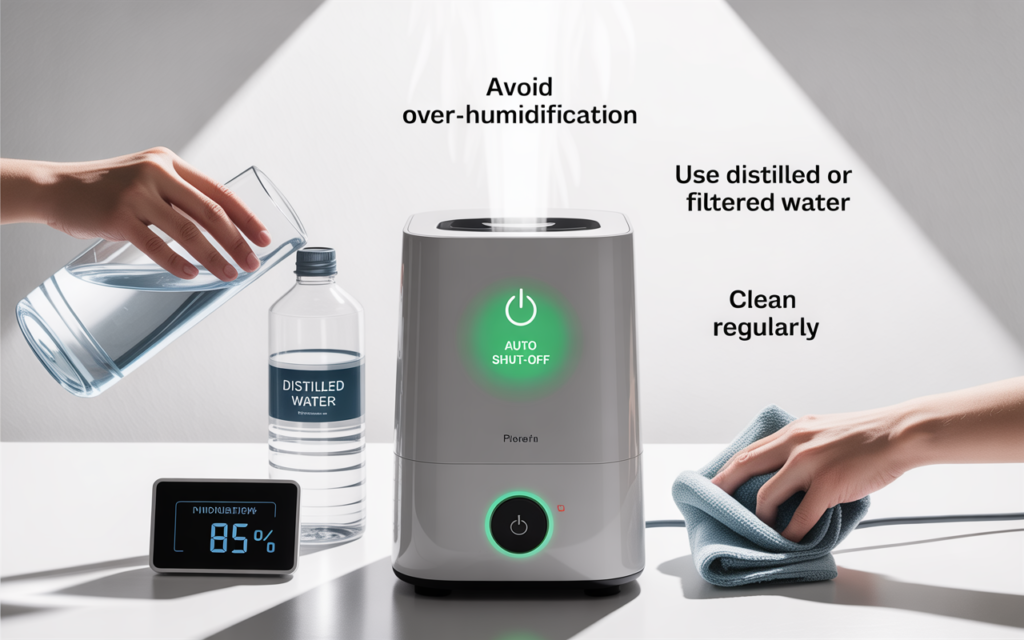Can You Leave the Humidifier on All Night?
If you’ve ever woken up with a dry throat, itchy skin, or stuffy nose, you may have wondered if keeping a humidifier running overnight could help. Many people use humidifiers to make their bedrooms more comfortable, especially during the winter or in dry climates. But one big question often comes up: “can you leave the humidifier on all night?”
What Does a Humidifier Do?
A humidifier adds moisture to the air, preventing it from becoming too dry. Dry air can cause:
- Dry throat and nose
- Cracked lips
- Itchy, flaky skin
- Worsened allergies or asthma
- Irritated eyes
By increasing humidity, a humidifier helps balance indoor air, making breathing easier and sleep more restful.
Can You Leave a Humidifier on All Night?
Yes, you can leave a humidifier on overnight if:
- The room humidity is monitored (ideally between 40–60%)
- The humidifier is clean and maintained
- You follow the manufacturer’s safety instructions
Leaving it on can actually improve sleep quality, but you should also consider safety and comfort factors.
Benefits of Sleeping with a Humidifier
- Better Breathing – Keeps nasal passages moist, reducing congestion and snoring.
- Improved Sleep – Comfortable humidity helps you sleep deeper without dryness.
- Skin Hydration – Prevents overnight skin dryness and irritation.
- Allergy Relief – Moist air can reduce dust and pollen irritation.
- Protection for Vocal Cords – Prevents a dry throat, especially helpful if you speak or sing often.
- Comfort for Children & Babies – Helps little ones sleep better when they have colds.
- Healthier Environment – Proper humidity reduces risk of flu and bacterial spread.
- Furniture Protection – Prevents wood cracking from dry air.
Precautions Before Leaving a Humidifier on All Night

- Avoid Over-Humidification – Too much moisture can cause mold and dust mites.
- Use Distilled or Filtered Water – Tap water can release minerals into the air (“white dust”).
- Clean Regularly – Dirty tanks may grow mold or bacteria.
- Position Wisely – Place it a few feet away from your bed and not near walls.
- Check for Auto Shut-Off – Many modern humidifiers turn off when the tank is empty.
Tips for Safe Overnight Use
✅ Use a humidistat or built-in humidity sensor to keep levels balanced.
✅ Place the humidifier on a flat, elevated surface (like a table).
✅ Keep it at least 2–3 feet away from the bed.
✅ Clean the tank every 2–3 days with vinegar or mild soap.
✅ Replace filters as per instructions.
✅ In baby rooms – always use a cool-mist humidifier (not warm mist).
Remember
- Ideal bedroom humidity: 40% to 60%
- Too much moisture = mold, dampness, musty smell
- Too little moisture = dryness, irritation
- Safety first: never leave a humidifier near electric sockets or fabrics
Point to Ponder
- If you live in a very humid climate, leaving a humidifier on all night might not be necessary.
- If you already have condensation on windows or dampness in the room, your air is likely already too moist.
- Babies and older adults benefit more from overnight humidifier use, but also need extra caution for safety.
Common Mistakes to Avoid
❌ Using tap water without filtering
❌ Placing it directly next to the bed
❌ Forgetting to clean it regularly
❌ Running it in an already humid room
❌ Ignoring signs of mold or musty smell
Final Thoughts
Leaving a humidifier on all night is not only safe but also very beneficial for health, comfort, and sleep quality—as long as you follow precautions. Clean it regularly, monitor humidity levels, and use the right type for your room.
About Author
Tayyabah Zahoor, a Physics graduate and skilled content writer, has built her expertise in reviewing home environment products. After creating in-depth guides on air purifiers, she has now expanded her focus to humidifiers. By applying her scientific background, she evaluates their performance, features, and benefits to help readers make confident and informed choices for healthier indoor air.
